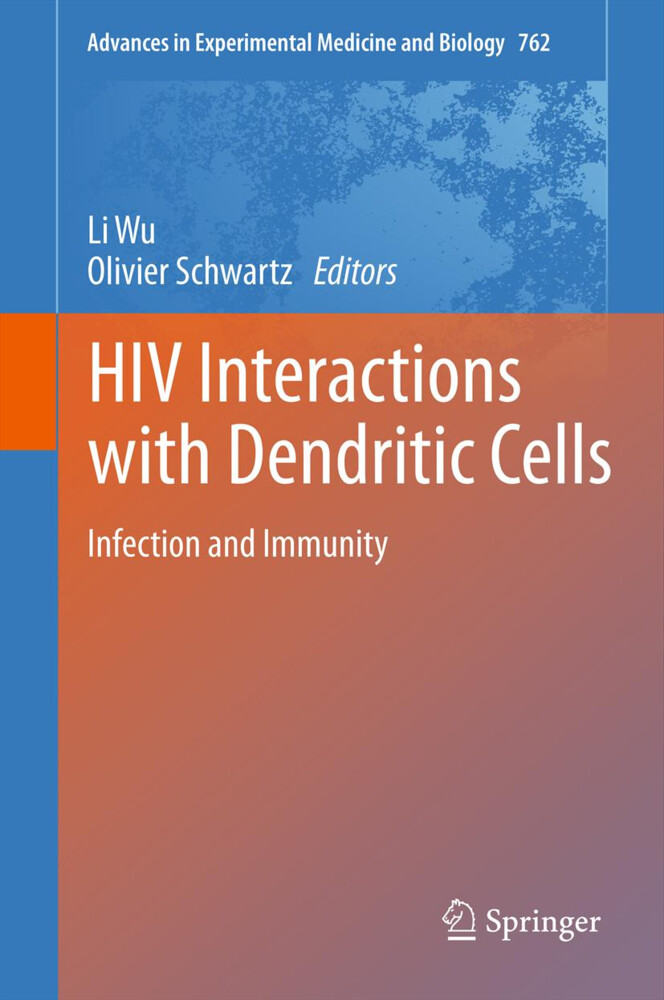
Zustellung: Fr, 06.12. - Di, 10.12.
Versand in 1-2 Wochen
VersandkostenfreiBestellen & in Filiale abholen:
This book synthesizes rapid progress of research and advanced techniques the study of HIV interactions with host cells and factors. The editors summarize the current literature, and offer critical analysis and an appraisal of future directions in research. Given rapid research progress and advance of the techniques in studying HIV interactions with host cells and factors, there is a critical need for a book on HIV interactions with DCs. The proposed book will aim for a broad readership to facilitate HIV/AIDS research and provide a practical tool for HIV researchers to continuously address novel questions. Specifically, the editors will summarize the literature in this field and provide critical analysis and future directions. International researchers will be invited as contributors of the book, highlighting authors who have contributed significantly to the field from different angles and aspects of virology, cell biology and immunology, etc.
Studying the mechanisms of HIV-1 interactions with dendritic cells (DCs) is critical to understand HIV pathogenesis and develop more effective interventions against HIV infection and AIDS. DCs perform a pivotal role in the induction and regulation of the adaptive immune response; however, HIV impairs DC function and exploits DCs to spread viral infection to target CD4+ T cells. Interactions between HIV and DCs are of vital importance because DCs are among the first cells to encounter HIV-1 at the mucosal surface. Immature DCs allow productive HIV replication and long-term viral dissemination. As immature DCs traffic to the lymph node, they become mature and are highly proficient at transmitting HIV-1 to CD4+ T cells for efficient viral spread. Thus, DCs can be hijacked by HIV-1 to aid in the initial stages of HIV-1 infection of a host, with roles in establishment of an infection and dissemination of HIV-1 throughout the host. In addition, HIV interactions with DCs alter innate and adaptive immune responses to the virus, which can impair anti-HIV immunity and play an important role in HIV persistence. Furthermore, as professional antigen presenting cells, DCs have been targeted for developing more effective AIDS vaccine.
Given rapid research progress and advance of the techniques in studying HIV interactions with host cells and factors, there is a critical need for a book on HIV interactions with DCs. The proposed book will aim for a broad readership to facilitate HIV/AIDS research and provide a practical tool for HIV researchers to continuously address novel questions. Specifically, the editors will summarize the literature in this field and provide critical analysis and future directions. International researchers will be invited as contributors of the book, highlighting authors who have contributed significantly to the field from different angles and aspects of virology, cell biology and immunology, etc.
Given rapid research progress and advance of the techniques in studying HIV interactions with host cells and factors, there is a critical need for a book on HIV interactions with DCs. The proposed book will aim for a broad readership to facilitate HIV/AIDS research and provide a practical tool for HIV researchers to continuously address novel questions. Specifically, the editors will summarize the literature in this field and provide critical analysis and future directions. International researchers will be invited as contributors of the book, highlighting authors who have contributed significantly to the field from different angles and aspects of virology, cell biology and immunology, etc.
Inhaltsverzeichnis
Preface.- Immunobiology of dendritic cells and the influence of HIV infection.- Antiviral immune responses by human Langerhans cells and dendritic cells in HIV-1 infection.- Plasmacytoid dendritic cells in HIV infection.- Cellular and viral mechanisms of HIV transmission by dendritic cells.- Role of glycosphingolipid in dendritic cell-mediated HIV-1 trans-infection.- Simian immunodeficiency virus interactions with macaque dendritic cells.- Interactions between HIV-1 and innate immunity in dendritic cells.- HIV impairment of immune responses in dendritic cells.- HIV-derived vectors for gene therapy targeting dendritic cells.- Targeting dendritic cells for improved HIV-1 vaccines.- Index.
Produktdetails
Erscheinungsdatum
11. September 2012
Sprache
englisch
Auflage
2013
Seitenanzahl
308
Reihe
Advances in Experimental Medicine and Biology
Herausgegeben von
Li Wu, Olivier Schwartz
Verlag/Hersteller
Produktart
gebunden
Abbildungen
XII, 296 p.
Gewicht
629 g
Größe (L/B/H)
241/160/22 mm
Sonstiges
HC runder Rücken kaschiert
ISBN
9781461444329
Entdecken Sie mehr
Bewertungen
0 Bewertungen
Es wurden noch keine Bewertungen abgegeben. Schreiben Sie die erste Bewertung zu "HIV Interactions with Dendritic Cells" und helfen Sie damit anderen bei der Kaufentscheidung.









